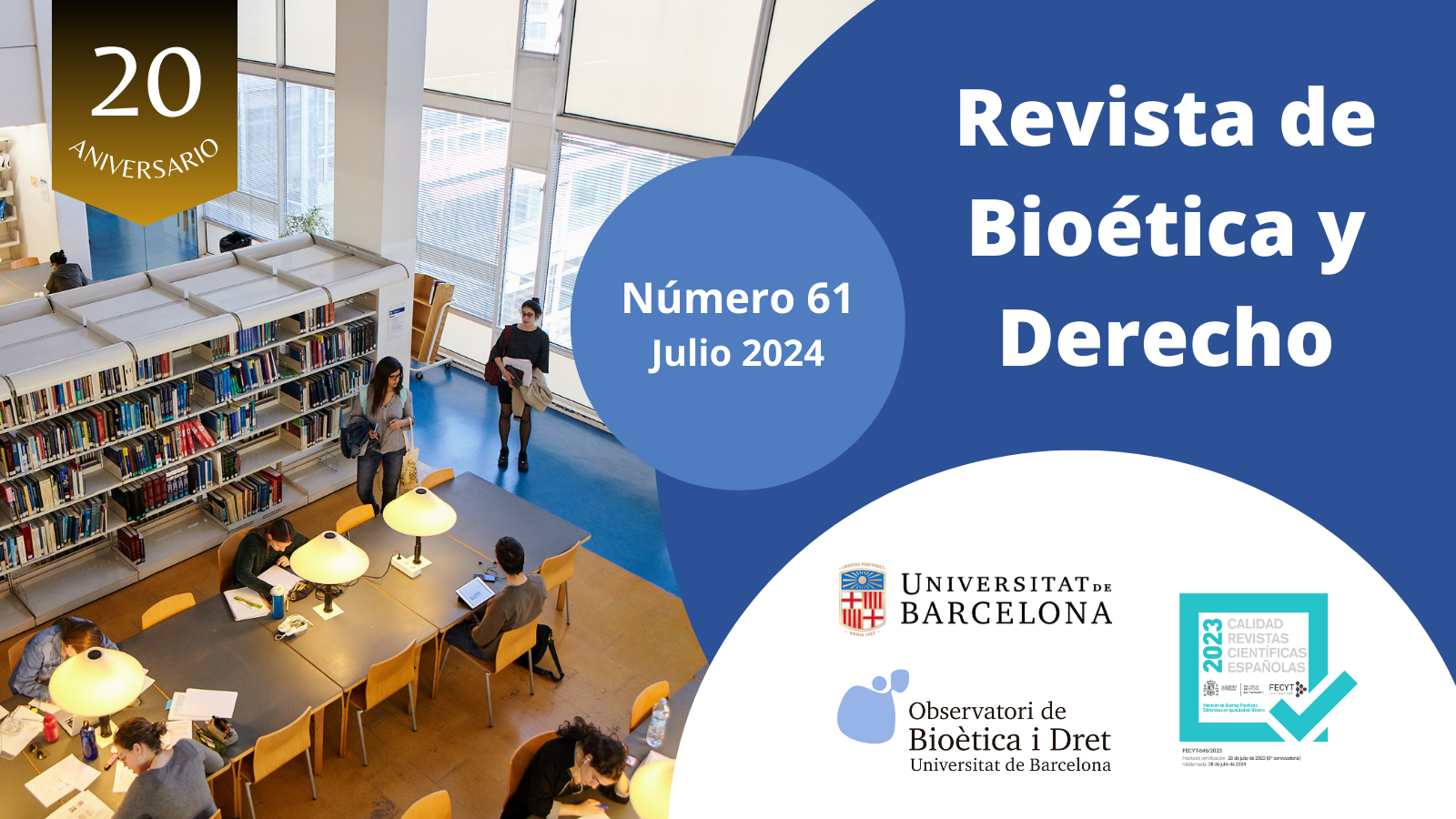Gestación por sustitución y movilidad de biomateriales y seres humanos
DOI:
https://doi.org/10.1344/rbd2024.61.45180Palabras clave:
gestación por sustitución, movilidad biomateriales humanos, movilidad humana, turismo reproductivo, doble parámetroResumen
La movilidad de biomateriales humanos en España está prohibida para ser utilizados para la gestación por sustitución. La gestación por sustitución igualmente no está admitida en el ordenamiento jurídico español. A pesar de ambas prohibiciones, numerosas personas viajan al extranjero a países donde la gestación por sustitución es legal para tener un bebé mediante esta técnica. Igualmente, es imposible verificar si no se producen traslados de biomateriales humanos a otros países para ser utilizados en procesos de gestación por sustitución. Este caso ilustra perfectamente el doble parámetro ético y legal que el ordenamiento jurídico español tiene frente a la medicina reproductiva en general y frente a la movilidad de biomateriales humanos.
Citas
Calhaz, J., et al. (2016). Assisted reproductive technology in Europe, 2012: Results generated from European registers by ESHER. Human Reproduction, 31 (8), 1638–1652.
Cohen, G. (2014). Las fronteras del derecho sanitario: globalización y turismo médico. AFDUAM, 18, 21-44.
Ferraretti, A.P.; Pennings, G.; Gianaroli, L.; Natali, F.; Magli, C. (2010). Cross-border reproductive care: a phenomenon expressing the controversial aspects of reproductive technologies. Reproductive Biomedicine Online, 20, 261-266.
Hudson, N.; Culley, L.; Herbrand, C.; Pavone, V.; Pennings, G.; Provoost, V.; Coveney, C.; Lafuente Funes, S. (2020). Reframing egg donation in Europe: new regulatory challenges for a shifty landscape. Health Policy & technology, 9 (3), 308-313.
Igareda González, N. (2020). Legal and ethical issues in cross-border gestational surrogacy. Fertility & Sterility, 113 (5), 916-919.
Igareda González, N. (2019). Regulating surrogacy in Europe: Common problems, diverse national laws. European Journal of Women’s Studies, 26 (4), 435-446.
Igareda, N. (2018). La gestación por sustitución: una oportunidad para repensar la filiación y la reproducción humana. Revista Bioética y Derecho, 44, 57-72.
Kroløkke, C.H. (2014). West is best: Affective assemblages and Spanish oocytes. European Journal of Women’s Studies, 21 (1), 57–71.
Machin, R.; Augusto, M.H.; Mendosa, D. (2018). Cross-border reproduction: the reproductive market in Angola and Brazil. Papeles del CEIC. International Journal on Collective Identity Research, 2 (198), CEIC (Centro de Estudios sobre la Identidad Colectiva), UPV/EHU Press, http://dx.doi.org/10.1387/pceic.18888.
Marre, D., B. San Román, and D. Guerra (2018). On reproductive work in Spain: transnational adoption, egg donation, surrogacy, medical anthropology. Routledge, 37 (2), 158–173.
Morero, A. (2018). Características de las familias creadas por gestación subrogada en el Estado español. Papeles del CEIC. International Journal on Collective Identity Research, 2 (199), CEIC (Centro de Estudios sobre la Identidad Colectiva), UPV/EHU Press, 2018, http://dx.doi.org/10.1387/pceic.18966.
Lafuente, S. (2019). Shall we stop talking about egg donation? Transference of reproductive capacity in the Spanish Bioeconomy, BioSocieties, 15, 207–225.
Lamm, E. (2012). Gestación por sustitución. Realidad y Derecho. InDret. Revista para el análisis del derecho, 3, 1-49.
Pennings, G. (2006). International parenthood via procreative tourism” in Shenfield, F. and Sureau, C. (eds.). Contemporary ethical dilemmas in assisted reproduction, Abingdon, Oxon: Informa Health Care, 43-56.
Pennings, G. (2007). Ethics without boundaries: medical tourism in Ashcroft, R.; Dawson, A., Draper, H. and McMILLAN, J. (eds.). Principles of health care ethics. London: John Wiley & Sons, 505-510.
Pennings, G.; De Wert, G.; Wert, E.; Shenfield, F.; Cohen, E.; Tarlatzis,B.; and Devroey, P. (2008). ESHRE Task Force on Ethics and Law 15: Cross-border reproductive care. Human Reproduction, 23 (10), 2182-2184.
Pino Avila, A. (2023). La autonomía reproductiva en la jurisprudencia del Tribunal Europeo de Justicia. Pamplona: Aranzadi.
Quiñones, A. (2009). Doble filiación paterna de gemelos nacidos en el extranjero mediante maternidad subrogada. InDret. Revista para el Análisis del Derecho, Barcelona, Julio 2008, 1-25.
Roque, M., Lattes, K., Serra, S., Solà, I., Geber, S., Carreras, R., & Checa., M. A. (2013). Fresh embryo transfer versus frozen embryo transfer in in vitro fertilization cycles: a systematic review and meta-analysis. Fertil Steril, 99(1), 156-162.
Stoll, J. (2013). Surrogacy Arrangements and Legal Parenthood. Swedish Law in a Comparative Context, Uppsala: Uppsala University Publications.
Descargas
Publicado
Cómo citar
Número
Sección
Licencia
Derechos de autor 2024 Noelia Igareda

Esta obra está bajo una licencia internacional Creative Commons Atribución-NoComercial-SinDerivadas 4.0.
 Las/os autoras/es conservan los derechos de autoría de los artículos y autorizan a la Universitat de Barcelona a publicarlos en su Revista de Bioética y Derecho y a incluirlos en los servicios de indexación y abstracts, bases de datos académicas y repositorios en los que participa la revista.
Las/os autoras/es conservan los derechos de autoría de los artículos y autorizan a la Universitat de Barcelona a publicarlos en su Revista de Bioética y Derecho y a incluirlos en los servicios de indexación y abstracts, bases de datos académicas y repositorios en los que participa la revista.
Los trabajos publicados en la Revista de Bioética y Derecho están bajo la licencia Creative Commons Reconocimiento - NoComercial - SinObraDerivada 4.0 Internacional (by-nc-nd 4.0), que permite compartir la obra con terceros, siempre que éstos reconozcan su autoría, su publicación inicial en esta revista y las condiciones de la licencia. No se permite un uso comercial de la obra original ni la generación de obras derivadas.







